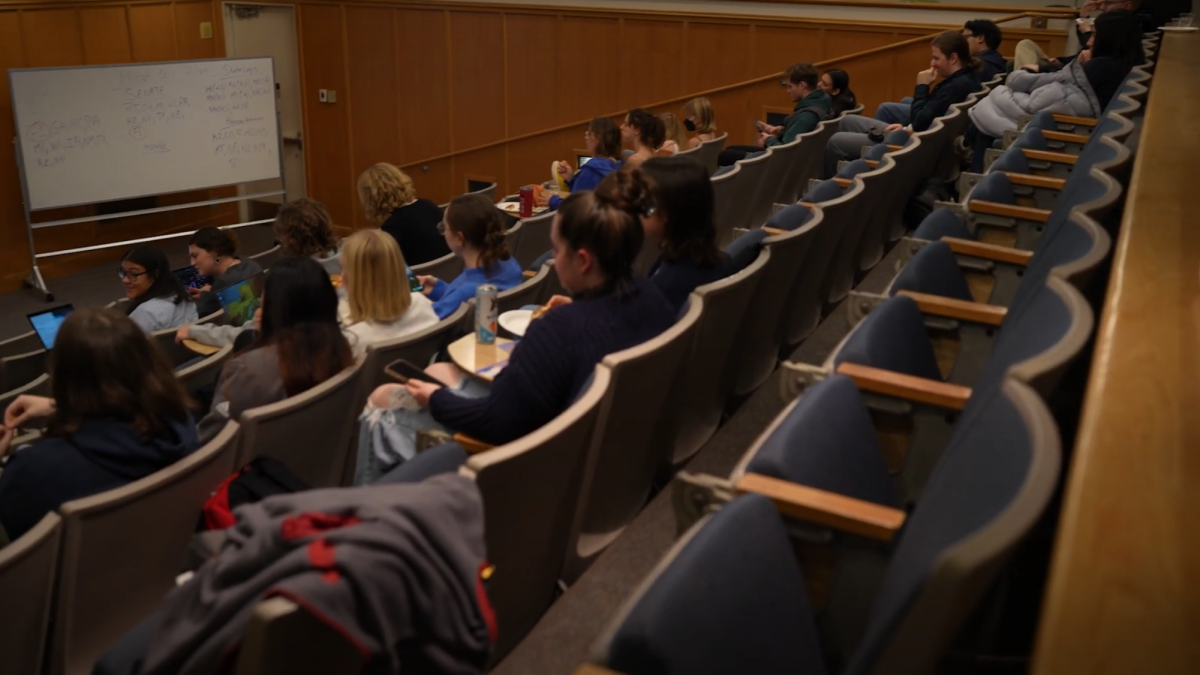As Election Day arrived Nov. 5, some last-minute voters emerged from the woodwork to mail their ballots and fulfill their civic duty. Students from various backgrounds, majors, and years gathered in Wyckoff Auditorium in Bannan for a watch party hosted by Seattle University’s political science department. The room buzzed with anticipation as polls began to close in different states, and some students contemplated the prospect of a new presidency after four years under the Biden administration.
The watch party was led by Patrick Schoettmer, an associate teaching professor of political science at Seattle U. Schoettmer outlined key races to watch on both local and national levels as the night progressed.
“At the federal level, we are looking at a few key Senate races to see whether or not the Democrats will hold the Senate or flip the House. And, of course, we’re focused on key swing states,” Schoettmer said.
Schoettmer also acknowledged the intensity of this election.
“It’s obviously a toss-up as to who’s going to win the White House. There are reasons to be both optimistic and pessimistic on either side,” Schoettmer said.
He then shared his predictions about the outcome of control in the House and Senate.
“I would say the odds are that Republicans will take the Senate, and more than likely, Democrats will [take] the House, flipping control. That would mean that whoever wins the White House won’t be able to move their agenda forward at all. So, we want to look at individual states and see how that plays out,” Schoettmer said.
Maya Walthall, a third-year political science major, attended the watch party and expressed anxiety as results started trickling in.
“I feel awful; I’m absolutely terrified. I’m reminding myself that I already made it through four years of a Trump presidency and that the Supreme Court is already against my beliefs, so it can’t get much worse,” Walthall said.
Walthall emphasized that while Election Day itself is significant, the days that follow are often more crucial in determining the ultimate outcomes.
“I don’t think we’ll know a winner tonight, or at least some of the key states probably won’t be called—or might even have a recount,” Walthall said.
Walthall, who cast her vote for Kamala Harris, shared insights on what the election means to students who didn’t feel fully represented by the candidates.
“I voted for Harris. I don’t fully agree with all her positions, but I think there are enough valuable policy standpoints that I felt comfortable choosing her over Trump, particularly her stances on abortion and climate change,” Walthall said.
Kate Goode, a third-year majoring in political science and anthropology, also attended the watch party. Goode described Election Day as a large spectacle in American politics.
“It feels a little bit like a big show, the big performance that everything has been adding up to,” she said.
Goode added that watching the election unfold felt more daunting than reassuring.
“Even though I cast my vote, I feel more out of control than ever, even though I know my vote has been counted,” Goode said.
As a first-time voter, Goode felt somewhat overwhelmed by the experience and not especially inspired by the system.
As the night progressed and Trump’s victory was solidified, students left the watch party with a mix of emotions and anxious uncertainty about the next four years.








